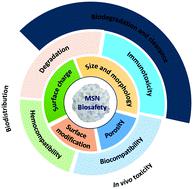当前位置:
X-MOL 学术
›
J. Mater. Chem. B
›
论文详情
Our official English website, www.x-mol.net, welcomes your feedback! (Note: you will need to create a separate account there.)
Biomedical application of mesoporous silica nanoparticles as delivery systems: a biological safety perspective
Journal of Materials Chemistry B ( IF 7 ) Pub Date : 2020-09-15 , DOI: 10.1039/d0tb01868f Sepanta Hosseinpour 1, 2, 3, 4 , Laurence J. Walsh 1, 2, 3, 4 , Chun Xu 1, 2, 3, 4
Journal of Materials Chemistry B ( IF 7 ) Pub Date : 2020-09-15 , DOI: 10.1039/d0tb01868f Sepanta Hosseinpour 1, 2, 3, 4 , Laurence J. Walsh 1, 2, 3, 4 , Chun Xu 1, 2, 3, 4
Affiliation

|
The application of mesoporous silica nanoparticles (MSNs) as drug delivery systems to deliver drugs, proteins, and genes has expanded considerably in recent years, using in vitro and animal studies. For future translation to clinical applications, the biological safety aspects of MSNs must be considered carefully. This paper reviews the biosafety of MSNs, examining key issues such as biocompatibility, effects on immune cells and erythrocytes, biodistribution, biodegradation and clearance, and how these vary depending on the effects of the physical and chemical properties of MSNs such as particle size, porosity, morphology, surface charge, and chemical modifications. The future use of MSNs as a delivery system must extend beyond what has been learnt thus far using rodent animal models to encompass larger animals.
中文翻译:

介孔二氧化硅纳米颗粒作为递送系统的生物医学应用:生物安全性的观点
近年来,介孔二氧化硅纳米粒子(MSNs)作为药物递送系统来递送药物,蛋白质和基因的应用已经大大扩展,使用了体外和动物研究。为了将来转换为临床应用,必须仔细考虑MSN的生物学安全性。本文综述了MSN的生物安全性,研究了诸如生物相容性,对免疫细胞和红细胞的影响,生物分布,生物降解和清除等关键问题,以及这些因素如何根据MSN的物理和化学性质(如粒径,孔隙率)而变化,形态,表面电荷和化学修饰。MSN作为传送系统的未来用途必须超越迄今为止使用啮齿动物模型涵盖更大动物所学的知识。
更新日期:2020-10-13
中文翻译:

介孔二氧化硅纳米颗粒作为递送系统的生物医学应用:生物安全性的观点
近年来,介孔二氧化硅纳米粒子(MSNs)作为药物递送系统来递送药物,蛋白质和基因的应用已经大大扩展,使用了体外和动物研究。为了将来转换为临床应用,必须仔细考虑MSN的生物学安全性。本文综述了MSN的生物安全性,研究了诸如生物相容性,对免疫细胞和红细胞的影响,生物分布,生物降解和清除等关键问题,以及这些因素如何根据MSN的物理和化学性质(如粒径,孔隙率)而变化,形态,表面电荷和化学修饰。MSN作为传送系统的未来用途必须超越迄今为止使用啮齿动物模型涵盖更大动物所学的知识。



























 京公网安备 11010802027423号
京公网安备 11010802027423号